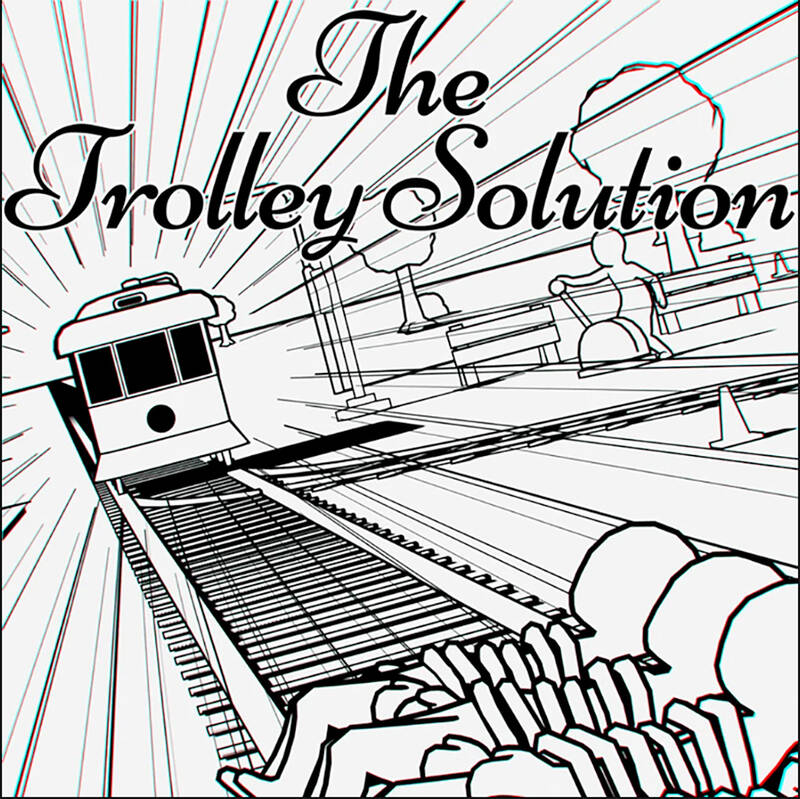In 1967, British philosopher Philippa Foot unwittingly created one of the Internet’s most regurgitated memes. A runaway train is hurtling towards five people tied to the tracks. You can pull a lever to divert the train to a different track to which only one person is tied. Do you intervene to kill the one and spare the five?
What if one of the tracks twisted into a really cool loop-the-loop? Or the trolley was replaced by a bloodthirsty Thomas the Tank Engine? Or the whole dilemma was clumsily altered to comment on the political controversy of the day? Originally formulated as a reflection on moral decision-making, the train problem found a second life in the 2010s as a well of inspiration for variously silly, irreverent and self-referential train-based memes. Now, it may be entering its third era as surreal interactive comedy game The Trolley Solution.
Each level plays as a minigame tenuously shaped around the thought experiment. There’s always a trolley, a lever and a pseudo-ethical dilemma, plus a twist to throw everything off the rails. The track is dissected into puzzle pieces that you must reassemble against the clock. A commuter next to the rails needs help remaining emotionally stable by balancing the blasts of serotonin they receive from scrolling social media. One level spirals into a short visual novel about a Japanese girl falling in love with a tram that threatens to murder her high school rival.

Photo courtesy of DanDans
It is, obviously, all very silly, and sees in the trolley problem the same absurdity as the memes.
“It’s a serious matter presented in a kind of ridiculous way,” says solo Chilean developer byDanDans. Or, as he puts it in terms of a Reddit thread: “It’s free real estate for shit-posting.”
With the basic gag already well worn, byDanDans focused on iterating the dilemma into quirkier scenarios and experimenting broadly with the minigames, before nailing down the final selection.
“Some iterations were too bland, too unfunny,” he says. “Or I just couldn’t think of a minigame that followed the four rules I set for myself.”
Those rules being that each minigame needed to be fun, connected to the dilemma that unlocks it, do something that hasn’t been seen before and subvert expectations.
Even so, if all this sounds a bit gimmicky that’s largely because it is. The trolley solution may be best thought of as an extended interactive sketch show based around a single joke. But it’s a joke with enough charm and a quick enough punchline (each minigame lasts from a few seconds to a few minutes, and the level select screen hints at a concise total run time) that it shouldn’t become stale.
In many ways, it’s also ideally suited to the era of social media. The humor is Internet-coded and the bite-size minigames are a perfect fit for quickfire TikToks pitched to video game laymen.
“I did try to make something easy to pick up and finish,” says byDanDans. “My previous games were too technical and too hardcore for most players. I tried to make something anyone could enjoy.”
Enjoy is a slightly weird word to use in the context of an ethical dilemma. If byDanDans were faced with the original trolley problem, what would he do?
“I’d have to go with the option that leads to fewer legal repercussions,” he says. “I’d call the cops, scream for help, and try to untie or push them off the tracks.”
So he’d ignore the parameters of the thought experiment and concoct a far-fetched scheme for added excitement? That tallies.

Aug. 4 to Aug. 10 When Coca-Cola finally pushed its way into Taiwan’s market in 1968, it allegedly vowed to wipe out its major domestic rival Hey Song within five years. But Hey Song, which began as a manual operation in a family cow shed in 1925, had proven its resilience, surviving numerous setbacks — including the loss of autonomy and nearly all its assets due to the Japanese colonial government’s wartime economic policy. By the 1960s, Hey Song had risen to the top of Taiwan’s beverage industry. This success was driven not only by president Chang Wen-chi’s

Last week, on the heels of the recall election that turned out so badly for Taiwan, came the news that US President Donald Trump had blocked the transit of President William Lai (賴清德) through the US on his way to Latin America. A few days later the international media reported that in June a scheduled visit by Minister of National Defense Wellington Koo (顧立雄) for high level meetings was canceled by the US after China’s President Xi Jinping (習近平) asked Trump to curb US engagement with Taiwan during a June phone call. The cancellation of Lai’s transit was a gaudy

From Godzilla’s fiery atomic breath to post-apocalyptic anime and harrowing depictions of radiation sickness, the influence of the nuclear bombings of Hiroshima and Nagasaki runs deep in Japanese popular culture. In the 80 years since the World War II attacks, stories of destruction and mutation have been fused with fears around natural disasters and, more recently, the Fukushima crisis. Classic manga and anime series Astro Boy is called “Mighty Atom” in Japanese, while city-leveling explosions loom large in other titles such as Akira, Neon Genesis Evangelion and Attack on Titan. “Living through tremendous pain” and overcoming trauma is a recurrent theme in Japan’s

As last month dawned, the Democratic Progressive Party (DPP) was in a good position. The recall campaigns had strong momentum, polling showed many Chinese Nationalist Party (KMT) lawmakers at risk of recall and even the KMT was bracing for losing seats while facing a tsunami of voter fraud investigations. Polling pointed to some of the recalls being a lock for victory. Though in most districts the majority was against recalling their lawmaker, among voters “definitely” planning to vote, there were double-digit margins in favor of recall in at least five districts, with three districts near or above 20 percent in